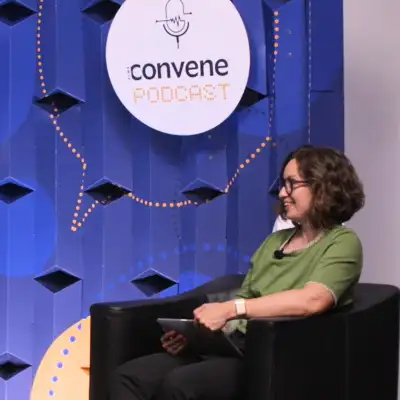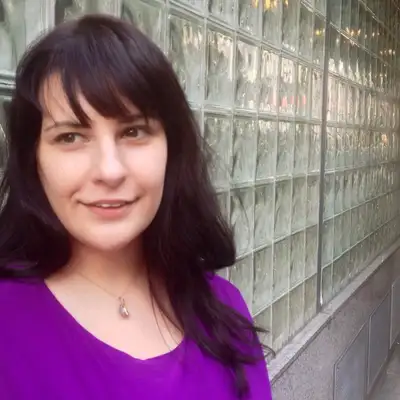Creators and Guests
What is PCMA Convene Podcast?
Since 1986, Convene has been delivering award-winning content that helps event professionals plan and execute innovative and successful events. Join the Convene editors as we dive into the latest topics of interest to — and some flying under the radar of — the business events community.
Convene Talk, ep. 67/June 20, 2025
*Note: the transcript is AI generated, excuse typos and inaccuracies
Magdalina Atanassova: This is the Convene Podcast. Welcome to another episode of the Convene Talk. Michelle, what have you picked for today's discussion?
Michelle Russell: Thanks, Maggie. Something I think a little lighter but very relevant. So this is a LinkedIn post by someone I follow, Juliet Font,
who really specializes in helping organizations find more white space, time to reflect,
think more deeply about things.
And I loved the topic of this story, which is how to stop worrying about tariffs and everything else.
And I think she just speaks to this kind of heavy feeling of uncertainty that we're all operating with that I know definitely affects my thought patterns throughout the day and how to deal with that.
And so one of the suggestions she makes,
and I love what she says,
is that a hidden tax is if you're thinking about in terms of the tariffs, the on and off and what's going to happen with everything having to do with the economy and pricing and specifically our industry.
We just did a story in yesterday's news junkie about how the retail footwear industry just has no way of knowing as the trade show season opens, what to expect in terms pricing, in terms of consumer purchasing.
And so she said a hidden tax is being levied on your leadership. It's not economic,
it's cognitive ambiguity is eating your clarity alive.
So what she suggests is to contain your cognitive load is first of all to make an appointment with stress.
So it works like this. Instead of trying to suppress worry or letting it run in the background all day, you create a dedicated time block,
say 10 minutes to think about the big ambiguous challenges. You let your mind go there, tariffs, disruption, uncertainty, how that may affect you, how it may affect your industry and then you close, she said the mental door.
You've addressed it, you've honored the need to think. But now the rest of the day you refrain from thinking about that and you just focus on your higher value work.
The other thing I love that she suggested is a technique from the theater world. And she said that actors who are nervous before a sometimes lean in and they try to feel more nervous on purpose.
And I thought, oh, this is a great little trick because I really don't like speaking in front of people.
I'm going to try that next time and also just be more aware of your monologue, your internal monologue, and then how you project that in your conversations with other people and try to rein that in a bit.
So I'm wondering if this resonated with the rest of the team the way it sat with me.
Maggie, I see you're nodding. Go ahead.
Magdalina Atanassova: I am. Because When I read her little tip to block time and think about what's stressing you out,
I immediately went to Nir Eyal and his tips on time blocking.
And it's kind of the same idea.
One of the things that really occupies our time is social media.
Many of us enter the doom scroll and we, you know, you look up and a few hours have passed and you're like, oh, my God, what? What just happened?
So one of his tips to avoid that was to actually block time on your calendar for social media browsing.
And I thought that was a great idea, so I actually started implementing.
It was a few years ago already.
And it really helps because it takes your mind away from that need,
so you definitely feel more in control of how your day goes. You know, you have dedicated time for that, so you don't have to think about it and stress about it and be like,
oh,
should I scroll now? Because maybe I'll miss something. But you're like, okay, I have one hour later in the day, and then I'll check who's doing what. And after this hour, you feel satisfied.
You've satisfied the needs. You. You've done it. You've not actually interrupted your day in a crazy way.
And it feels also a little bit crazy putting social media browsing on your calendar.
It looks a little off at the beginning, but once you get used to it and see the power of it, it's like, oh, okay, that makes sense. So it definitely resonated with me in that sense.
Kate.
Kate Mulcrone: Just to add to what both you said, Maggie and Michelle,
I'm stealing this idea from the TV show Shrinking on Apple plus, Harrison Ford's character is diagnosed with a terminal illness, and he's a practicing psychotherapist,
and he actually shares a tip with one of his patients that,
sure, you know, I don't want to die. And I start to think about it, so. So I set a timer on my phone for 15 minutes,
and I have 15 minutes to feel sorry for myself and to think about how much I don't want this to be happening to me.
And then the timer goes off and I move on.
I started to do that once I saw the show. 15 minutes is perfect.
So now, yeah, when I find myself entering the beginning of the panic spiral, I just say, okay, and do I want to go here? Do I want to step away and take my 15 minutes now?
Or do I just want to do it later?
And a lot of the time I just don't even remember to come back to it. But knowing I'm going to set the timer for 15 minutes.
It's just enough to manage those feelings.
And I will pass it over to Jen.
Jennifer N. Dienst: Thanks. Yeah, no, I think it's interesting advice because I think it can really apply to anything that we struggle with. The advice was given to me to schedule grief grieving.
I actually am just scrolled through something and I saw someone post about grieving,
also grieving their sibling. And it's just something about like scheduling it, which I thought at first I was like, are you kidding me?
When,
like that was first suggested to me and they were like, ha, ha, ha ha, Gr. You know, like,
try it. But it, it actually, now that I've, I, it's. There's been some time, I do understand it. And I think that,
like, you could really apply it to anything that you're struggling with cognitively or emotionally,
whether it's addiction to social media or stressing out about what's going on in the world or grieving or, you know, whatever it is. Like, it makes sense to at least try to do it.
Whether or not you're successful is another story.
But yeah, I, I think that that's interesting. When I, when I first read that story, that's immediately what popped into my mind is, is that advice that was given to me,
I think easier said than done.
I wish there was a little bit more in the article that talks about how to do that.
I kind of think back to my yoga teacher training. You know,
when you're meditating,
I'm thinking in my mind it's similar to the process of trying to meditate, which is your mind naturally wanders. That's what it does. It's what it's designed to do.
But you kind of bring it back to the present, bring it, bring it back to your breath. And maybe that same type of exercise is useful for this strategy.
Again, it's hard though, I think in our jobs because we're journalists, we're writers, it's part of our jobs to pay attention to what's going on in the world.
So, so.
And I would think, you know, event planners probably feel the same. They have to pay attention to what's going on in the world and how it might affect their events, whether it's political or weather or whatever.
And,
you know, you, you can only be checked out for so long, so you have to strike that balance. And striking that balance is not easy. Michelle, what are you thinking?
Michelle Russell: I think that's a really good point.
I think for me, what it means is not to spiral so that, yeah, we have to cover the news. This is what we do. So we see all of this negative stuff happening,
but not to let it create such a great space in your head. Take up so much space in your head that you feel like you're spiraling,
and it affects your mood and your ability to produce and feel good about things. And I'm just led back to.
We wrote a story about a TED Talk that was one of our best read stories. It was Lucy Hone,
and she's a grief counselor in Australia who lost her own child in an accident.
And it's just a powerful TED Talk.
And one of the things she says that I have repeated to myself and to other people so many times is she kind of stopped herself from going through. Every night, she would go through all of the photo albums and look at her daughter and just feel helpless and sad and hopeless.
And she started asking herself this simple question,
is what I'm doing helping or harming me?
And I think asking yourself that question, when you constantly have something going on, replaying in your mind,
it helps to stop and say,
this is not serving me.
And so I just think that's like one little thing that you can also do,
whether it's grief or whether it's just general anxiety about what's going on in the world.
Magdalina Atanassova: Yeah. Which kind of brings it to her other point, about the stories you're telling yourself, which I think is very important that we keep in mind that we shouldn't believe everything that goes on,
you know,
between our ears. All those thoughts, they're not necessarily reality.
And if we trust them too much, they may lead us astray and lead us into those,
you know, mental states we don't want to enter.
So I thought that was a very good reminder that she made and said, you know, just focus on what stories you're telling, because you.
You may even try to stop and think about it and try to see, are there any other angles that you may be missing? Is it that you're just focusing on just this one point and you're missing the whole big picture?
And that may help, especially in such trying times where things are changing quickly.
But as we heard throughout the pandemic, the opportunity. There is opportunity in all these uncertainty and in difficult times. So,
yes, it may sound a little cheesy. It may sound difficult, especially when you're in the. In a bad spot, when somebody tells you, hey, no, there is an opportunity, and you're like, just, you know, get lost.
Tell me such things.
Not right now. I don't see any opportunity right now, but I think that's where the opportunity is. It's just not in your focal point. It's somewhere around.
Michelle Russell: I just wanted to say about social media, I definitely think that if you start,
obviously all the algorithms are going to continue on what you focus on. So if you focus on something, you're going to continually be fed more of the same. So that is also a little counterproductive.
Magdalina Atanassova: Yeah, social media is difficult and with all these devices listening to us and just feeding us more of what we're saying,
it's not helping.
Yeah,
certainly not helping. And I also liked what she was saying.
How did she phrase it?
Regaining executive clarity.
I just like that sentence.
Yeah,
it's cool.
And from what I understand, that's also a part of her book that she wrote.
So there's more in her book that I'll also link in the show notes where people can, you know, if they're inspired, they can follow her on LinkedIn, get her newsletter or read her book.
Thanks to you all for the great conversation.
Michelle Russell: Thanks, Maggie.
Magdalina Atanassova: Remember to subscribe to the Convene Podcast on your favorite listening platform to stay updated with our latest episodes. For further industry insights from the Convene team, head over to PCMA.org/convene. My name is Maggie. Stay inspired. Keep inspiring. And until next time.



